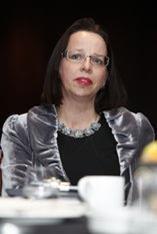
In fresh produce, it’s fair to say, businesses are used to longevity. Casting an eye down the FPJ staff list of the last 20 years, there are plenty of recognisable faces, albeit adorned with questionable haircuts. But many retail businesses have a much higher turnover of staff and it’s a credit to Jane Speakman that she has worked her way up to take charge of one of the supermarket’s most important and lucrative departments.
Speakman comes from a farming background, growing up near Grantham in Lincolnshire, before graduating from Harper Adams in Shropshire and subsequently joining Morrisons. During her 22 years with the business, Speakman has seen the supermarket grow from a regional retailer with 42 stores to a major national player and in recent years, incorporate Safeway and undergo a complete rebrand.
Morrisons has been praised for its flower tactics, selling more bouquets packed with lower-value flowers, and the swift six-month acquisition of large-scale independent importer and distributor Flower World last month has raised the bar a step further. The buy out of the Derby-based business, which last year generated sales of £33.7 million in the year to August 2010, represents a significant challenge for Morrisons in integrating a high-end supplier. It proved an opportunity that Speakman could not resist.
“It absolutely takes my career to a different level to head up an entire business,” she says. “I have spent a number of years looking at procurement and retailing, but never the whole chain. In this role, it’s giving me the opportunity to run the firm from end to end from procurement to packing in Derby and the retail development as a whole and look at a vertical model.
Speakman will “glean every bit of knowledge” from Flower World founder Peter Woodhouse, who set up the business in 1987, and will split her time between working with its 185 employees in Derby and Morrisons’ base in Bradford.
“The key knowledge development for me is around when we are putting the bouquets together - you look at the cost and value of each stem,” says Speakman, who is tasked with managing the supply of cheap, £2 bouquets and £35 premium offerings.
So what does she make of the overall supermarket flower game? “At the moment, you have to consider that most people want to spend a bit of money on flowers but are also looking carefully at their disposable income,” she says. “I’ve found that seasonality is very similar on flowers as in fresh produce, so that’s crucial in getting value from your product. Also, the UK flower industry is competing hard with the Dutch on price so they have to make it clear why British tulips are better quality. At Morrisons, we offer incredibly good value and quality and have been able to maintain that; the challenge is that we have to continue to deliver that.”
Flower World has considerable expertise offering hand-tied bouquets - something Speakman says it has been doing for eight years and has got down to a “fine, profitable art” - with a crack team of designers aimed at rivalling dedicated florists and drawing people away from the high street and into stores.
Sourcing largely from the Netherlands, Egypt, Colombia and to a lesser extent, the UK, Speakman has been involved in testing the market with Morrisons’ pioneering, year-old Fresh Lab store in Kirkstall, Leeds. With the aim of developing the feel of a genuine florist, the retailer has seen positive results at the trial store that has more than a little room for bloom. Spacious aisles and a huge range of flowers dominate the store, which is used for analysing and reviewing ideas and ranges. A new lab will open in Swinton, Manchester, next month to “test a different demographic”.
A swathe of challenges face Speakman - business alignment, looking at an occasions range, extending shelf life, even countenancing online (a subject on which she will not be drawn) - but it’s clear she’s up to the challenge and has the skills at her fingertips to make Morrisons the UK’s pre-eminent florist.



